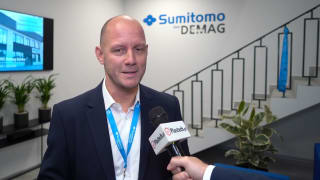
For the BSH washing machine production plant located in Łódź, Poland, the change to a new generation of appliances led to a new production strategy. Injection-molded parts, which had long been outsourced from external contractors, are now manufactured in-house. The injection molding partner Wittmann supported the new injection molding facility’s development by delivering large MacroPower machines - each equipped with an extensive automation package.
“With the development of our new appliances, we have responded to current customer demand”, explains Dr. Andrzej Pirek, Head of Department of Manufacturing Engineering, during our visit to BSH Sprzȩt Gospodarsrwa Domowego Sp. Z o.o. in Łódź. “All our washing machines now come with the highest energy efficiency class A. They also consume less water and run at a lower noise level.” The lion’s share of the washing machines manufactured in Łódź are destined for European markets. Mainly the global brands of Bosch and Siemens are made at this location.
Andrzej Pirek always keeps a close watch on the behavior and wishes of the consumers. Energy savings and more sustainability are the order of the day, and this is where households and production plants are in a very similar position. “Our aim is to make top-quality products with a long service life and maximum efficiency”, says Pirek. “Here, the injection molding technology from Wittmann makes a significant contribution. Both the MacroPower injection molding machines’ process stability and their low energy consumption have a very positive effect.”
As the factory grew, new platforms and new processes emerged. This year, the site is celebrating its 30th anniversary. Aligned with appliance development, all processes were analyzed. “We realized that we could tap a great savings potential by making the injection-molded parts ourselves”, Pirek reports.
Number of good parts exceeds target
On the day of our visit, several MacroPower injection molding machines - all with 900 tons clamping force - are standing in a row in the new injection molding hall. No less impressive are the components the linear robots are removing from the molds and stacking on pallets placed directly beside the machines. There are two different types of round parts, both very large and complex with many connection and assembly elements, destined to enclose the washing drum later on in the end product, after they have been joined together. Both housing halves are injection-molded from fiberglass-reinforced polypropylene, each with the remarkable shot weight of just under 4 kilograms.
On the pallets, the freshly molded parts are first brought to an RFID-controlled FIFO storage facility, until they have reached their final geometry. From there, they are passed on directly to an assembly line in the neighboring production hall. There, the two housing halves are welded together using vibration welding. “For the quality of the weld seam, there is zero tolerance. The drum must be absolutely watertight to prevent leaks in the washing machine”, explains Pirek. The prerequisite here is extremely precise forming of the geometrically complex parts by injection molding. Here, the MacroPower injection molding machines bring their strengths into play with highly accurate servo-hydraulic movements and a reliably constant injection molding process. “Our scrap rate is below our original target”, comments Pirek with pleasure.

Systematic development of injection molding expertise
With its own injection molding facility, BSH has significantly increased the vertical range of manufacture at its Polish washing machine plant. All the important value creation stages now take place in-house, which has a positive effect on unit costs and consequently competitiveness. The new strategy is now paying off, but a number of obstacles had to be overcome to get there.
For the workforce in Łódź, injection molding was a completely new technology. Here, Wittmann Battenfeld Polska supported the project with an extensive, tailor-made training program. “We not only trained the machine operators, but also the maintenance and security staff, and the process engineers, too”, says Bogdan Zabrzewski, Managing Director of the Wittmann subsidiary in Poland, located in Grodzisk Mazowiecki, only 100 km east of Łódź. “The short distances are a definite advantage. Whenever we are needed, we are always quickly on site”, Zabrzewski comments.



